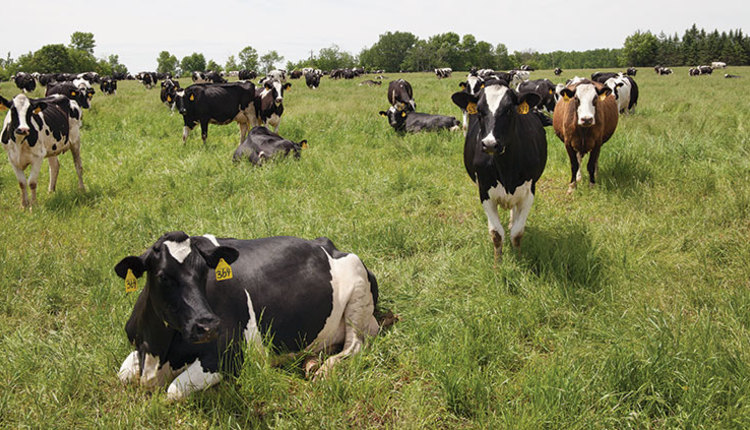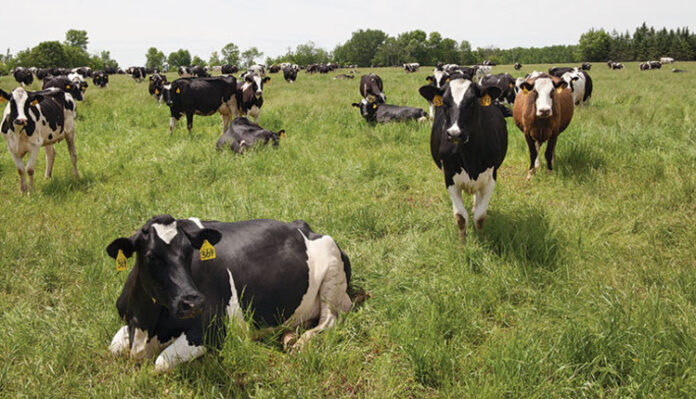
The Federal Government has inaugurated the National Livestock Breed Improvement Programme (NALBIP), saying the project will effectively curb the herders/farmers crop conflicts.
A statement on Monday in Abuja, by Mrs Eno Olotu, Deputy Director, Information, in the Ministry of Agriculture and Rural Development, said the Minister of Agriculture and Rural Development, Alhaji Muhammad Nanono, made this known on Monday in Kano during the inauguration of the programme.
Nanono said the NALBIP is one of the comprehensive and sustainable mechanisms put in place by the ministry to address the development and transformation of the livestock value chain in the agricultural sector.
He said the programme would improve the genetic makeup of the indigenous breeds of animals, especially dairy cattle to achieve increased milk and meat yield of the nation’s national herd.
Nanono also expressed optimism that the programme “will improve the livelihood of the pastoral communities and other livestock farmers and support the ministry in addressing the challenges in the livestock value chain particularly, the incessant Herder/Farmers Crop conflict”.
The Minister disclosed that the programme was targeted at the “evolution of hybrid filial generations of diary cows and other livestock with improved productivity potential and in the overall genetic improvement to the national herd”.
He explained that the programme would facilitate the Artificial insemination services through training and provision of essential tools and inputs to stakeholders.
Nanono expressed regret that despite the great potential in the livestock sector, “we have not achieved much to ensure adequate supply of animal protein, means of livelihood and increased income”.
He said some of the key challenges, like low level of investment, poor animal health services, poor access to market, poor fodder supply and livestock Management practices, have continued to prevent the sector from reaching its full potential.
The Minister noted that inadequate investments, due largely to under-funding from public and private sectors, absence of enabling government policies, sub optimal functioning institutional settings and linkages and regulatory gaps, have led to the inability to achieve sustainable transformation in the livestock value chains.
“This administration is poised to systematically address these challenges,” he promised.
Nanono said the exercise has come at a better time due to threats poised on the nation’s security, heightened by frequent conflicts, banditry and cattle rustling with resultant depletion of the national herd, creating fear and loss of sources of livelihood for Nigerians who depend on agriculture for their sustenance.
In his goodwill message, Governor Abdullahi Ganduje of Kano expressed appreciation on the choice of Kano for the pilot scheme of the programme, saying that the state has the comparative advantage in terms of its livestock population and vast arable land.
Ganduje, who was represented by the Kano State Commissioner of Local Government Affairs, Mr Murtala Garo, noted that the Breed improvement programme for the sector will upgrade the existing indigenous breeds and increase productivity.
The governor assured the Minister that the state government will continue to support the Federal Government in all its intervention efforts to the state.
Earlier, the Director, Animal Husbandary Department in the Ministry, Mrs Winnie Lai-Solarin, said that the Programme was part of the National Livestock Transformation Plan of the Federal Government of Nigeria.
“Animal Agriculture plays a significant role in the country’s agro-economy and contributes to the qualitative nutrition of the citizenry, job creation and food security status of our nation,” she said.
“It also lends significantly to the socio-economic livelihoods of the populace, particularly livestock value chain actors,” she said.
She said the Federal Government, through the ministry’s Department of Animal Husbandry Services, is commencing the National Livestock Breed Improvement Program (NALBIP) – a strategy designed to speedily upgrade the indigenous breeds of livestock by enhancing their genetic potential, increasing their milk yield and their efficiency generally.
Lai-Solarin pointed out that Nigeria’s population is growing at a faster rate than the increase in animals and animal products.
“This is critical for a country whose population is expected to reach about 402 million by the year 2050.
“Imperatively, only improved breeds which are adequately cared for to reach optimal production levels can alleviate poverty, ensure food security and meet the protein requirements of a growing population such as ours,” she said.
She, therefore, enjoined all stakeholders, particularly the private sector, to participate actively in the implementation of the NALBIP programme to ensure efficiency, sustainability, job creation, improved breed, increased productivity and income of smallholder livestock farmers.

